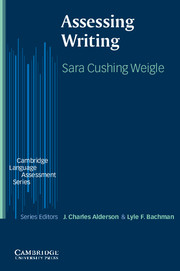Book contents
- Frontmatter
- Contents
- Series Editors' Preface
- Acknowledgements
- 1 Introduction
- 2 The nature of writing ability
- 3 Basic considerations in assessing writing
- 4 Research in large-scale writing assessment
- 5 Designing writing assessment tasks
- 6 Scoring procedures for writing assessment
- 7 Illustrative tests of writing
- 8 Beyond the timed impromptu test: Classroom writing assessment
- 9 Portfolio assessment
- 10 The future of writing assessment
- Bibliography
- Index
5 - Designing writing assessment tasks
Published online by Cambridge University Press: 03 May 2010
- Frontmatter
- Contents
- Series Editors' Preface
- Acknowledgements
- 1 Introduction
- 2 The nature of writing ability
- 3 Basic considerations in assessing writing
- 4 Research in large-scale writing assessment
- 5 Designing writing assessment tasks
- 6 Scoring procedures for writing assessment
- 7 Illustrative tests of writing
- 8 Beyond the timed impromptu test: Classroom writing assessment
- 9 Portfolio assessment
- 10 The future of writing assessment
- Bibliography
- Index
Summary
This chapter presents principles of test design for large-scale writing assessment – that is, testing beyond the level of the individual classroom. The chapter is divided into two parts; the first part presents general considerations in test development, specifically the use and importance of test specifications and the importance of pre-testing; the second half of the chapter presents considerations for designing writing tasks, which take into account the research on assessment discussed in Chapter 4. Throughout the chapter, sample writing tasks are presented that illustrate the main points under discussion.
The process of test development
General procedures for language test development can be found in numerous sources (e.g. Bachman and Palmer, 1996; Alderson et al., 1995; Norris et al., 1998; Davidson and Lynch, 2002). These sources emphasize that test development involves several stages, which do not proceed in a strictly sequential or linear fashion, but inform each other in an iterative fashion; that is, the feedback received at one stage of the process may make it necessary to return to a previous step to rectify a problem. One way to conceptualize the development process for a test of writing is to consider it as consisting of three stages: design, operationalization, and administration (Bachman and Palmer, 1996). The design stage involves gathering information about such things as the test purpose, characteristics of the target population and their real-world writing needs, and available resources.
Information
- Type
- Chapter
- Information
- Assessing Writing , pp. 77 - 107Publisher: Cambridge University PressPrint publication year: 2002
